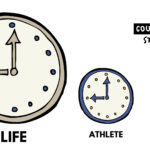Click above to start the audio version of this article
1. Create more short-term goals that lead to one bigger goal
Reason: Big goals and dreams are awesome. But to achieve those goals requires a lot of patience and steps in between. Instead focus on daily, weekly, monthly, and yearly goals that ultimately build towards the big goal. By setting smaller goals and achieving them, you will receive more frequent feedback on what you are doing right/wrong. In the end, the small nuances of training are given much more meaning. Making sure you lift weights today may not seem all that important in the long term, but when you define your small goals, you realize that for today it’s the only thing that matters.

2. Spend more time working on my weaknesses
Reason: Brute force and physicality were my two main ways of getting points. But in volleyball, that can only get you so far. I never spent the time working on my passing and eventually got pushed out of that role. I didn’t work on my blocking and found myself on the bench. It’s easy to show off our strengths. It’s hard to expose our weaknesses. They can be embarrassing to work on and difficult to change. But you know what’s more embarrassing — spending your final year of university losing your position to a younger player.
3. Develop a mindfulness practice
Reason: This one may not apply to everyone. But if you found yourself nodding your head when I talked about the Three F’s, then read on. A common trait of many successful athletes, entrepreneurs, and performers is having some sort of meditation practice. Whether it’s breathing exercises, guided meditation, or some other way of achieving a mindful state — the ultimate goal is to achieve awareness. Why are you anxious? Why are you impatient? What is giving you joy right now?

By taking the time to sit down, and clear our mind we gain clarity and perspective. It will allow us to be much more focused in times of stress and help to reduce anxiety. Just like any other muscle in our body, strengthening our brain takes time. But with a daily mindfulness practice, we can sharpen our minds and gain back some emotional control. Mindfulness is not about getting rid of all negative thoughts and emotions. It’s about giving us an understanding of what they are, why they exist and realizing they do not control you.
Book Recommendation: The Mindful Athlete – George Mumford
Not sure where to begin? Check out www.headspace.com
4. Read when I had the time (summers)
Reason: I cannot even begin to express how much I have learned from reading. I used to only read for school, but then I started doing it purely out of self-interest. I was simply amazed at the sheer volume of useful information that would come about from the different books I’ve read. Some of it only useful for small talk, but much of it has been simply life changing. If you are too busy to read during the school year, that’s fine — but the summer is where I highly encourage you to soak in as much as you can.
5. Coach more
Reason: There’s a wonderful subreddit known as r/explainlikeimfive. It’s a wonderful place where you can ask questions about complicated topics and receive simplified answers that even a five-year-old could understand. The reason these people can give you such simple and concise responses is because they truly understand what they are talking about. This is the truest sign of an expert and the same thing applies to sports. At a lower level, it is easier to get away with not fully understanding strategies and tactics of a sport. But when we reach the highest levels, those who genuinely understand the inner workings of the game will be the ones to stand out.
Therefore, coaching is the best step in improving your own skills. After spending some time trying to explain a skill to a young player, you will soon begin to see how well you actually understand it. And if you find yourself struggling to explain it, you probably don’t know it. So keep practicing.
6. Get some better friends. Seek out a mentor.
“You are the average of the 5 people you associate with most.” — Tim Ferriss
Reason: It’s easy to feel good about yourself when you are hanging out with deadbeats. When everyone around you is settling and not seeking out improvement, it’s easy to sink into a comfortable state. We even begin to trick ourselves into thinking that our minimal effort is exceptional in comparison to others. But it’s only human nature. We constantly compare ourselves to those around us. So why not improve the people who surround us on a regular basis.
Seek out the people who want more. The ones who aren’t content with their current state. Or find the ones who are already exceeding. After enough time spent with these people, you will begin to notice what makes them special. You start to take note of their daily practices and all the little things they are doing to improve themselves.

If you don’t have the luxury of just finding new friends, seek out a mentor. Find someone who has been in your shoes and provides you with some wisdom. Bouncing your ideas off this person can be beneficial for both parties involved. All you need to do is ask.
. . .
So what happens now?
Well, that’s a tough question and ultimately it’s not one that I can answer for you.
But here’s one final thing I can say: We are all going through life in our very own unique ways. There is no one true pathway. In fact, there are millions of paths we can encounter. Some will be freshly paved highways, some will be windy roads through the mountains full of switchbacks, some may even be a little bit bumpy, and then some will send you on what feels more like a suicide mission than an actual pathway. Yet, that’s just the way life goes. I cannot guarantee your safety along the way. But what I am offering is a previously used map. It’s one that is covered with poor choices and riddled with wrong turns. However, it’s also one that is packed full of treasure — with X’s that mark the spot.
My goal with this whole article was to hand over this map and show you where to go. But ultimately, I cannot force you to use it. That choice is yours.
-Derek






I’m pretty sure that every athlete can relate to what you say – no matter how old we are! Very well done! Much of what you say applies to any pursuit in life, including careers. I will be reading again! 😃👍🏻
Thanks for the feedback. I’m happy you found it helpful.
How can I contact you?
Hey, you can head over to the contact page and send me an email. https://www.dailyathlete.life/contact/
Or you can connect with me on Facebook. You can see the buttons above and below.
Love it. I will for sure read more. Thank you !
Hi Derek,
Thanks for this article.
I myself excel technically in soccer, but I am not athletic enough, and that is not helping me in my dream towards being a pro. I see players who are more athletic than me, but no way do I feel they are better technically. I wish I could improve this rapidly, but I just wasn’t born fast. I am doing everything I can to improve this weakness. Lucky for you to have already been physically gifted!
Hey Mario,
As much as people say that being “athletic” matters for becoming a successful athlete, it’s not the only thing that determines whether or not you go on to play pro. I’ve seen many athletes who were more athletic than me, but because they were poor teammates, they struggled to find success down the line. I’ve also had teammates who were probably less physically gifted than me, but because of their superior technical skill they didn’t have to rely on physical traits and were able to just out-think and out-hustle me.
Yes, some people are a little more naturally coordinated, faster, or just bigger. But as my whole story shows — that’s not enough. If you can stop worrying about the uncontrollables (like your genetics) and learn to instead double down on what you’re already good at, you can make yourself an extremely valuable athlete for any team.
Keep your head up and stay focused on what matters to you — which is your values, your goals and your daily actions. Don’t let the outside opinions distract you.
Derek